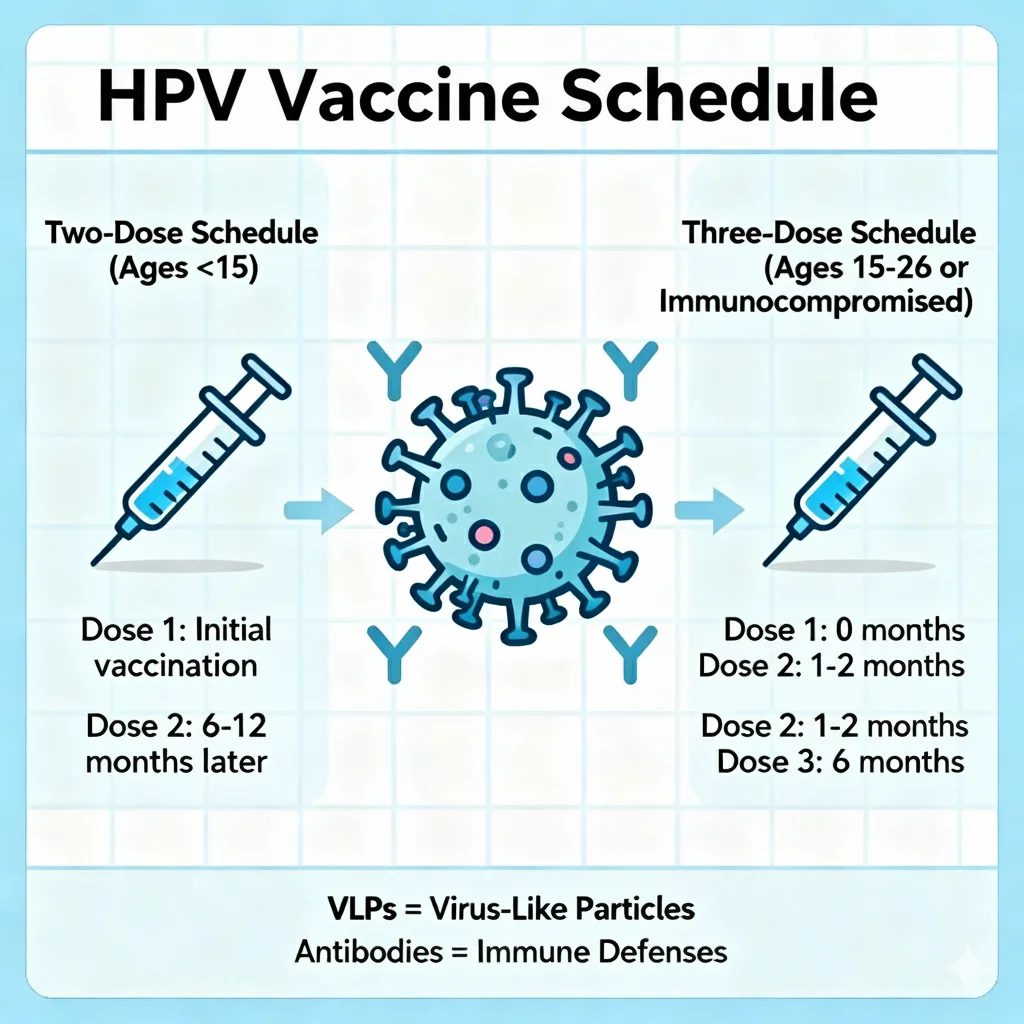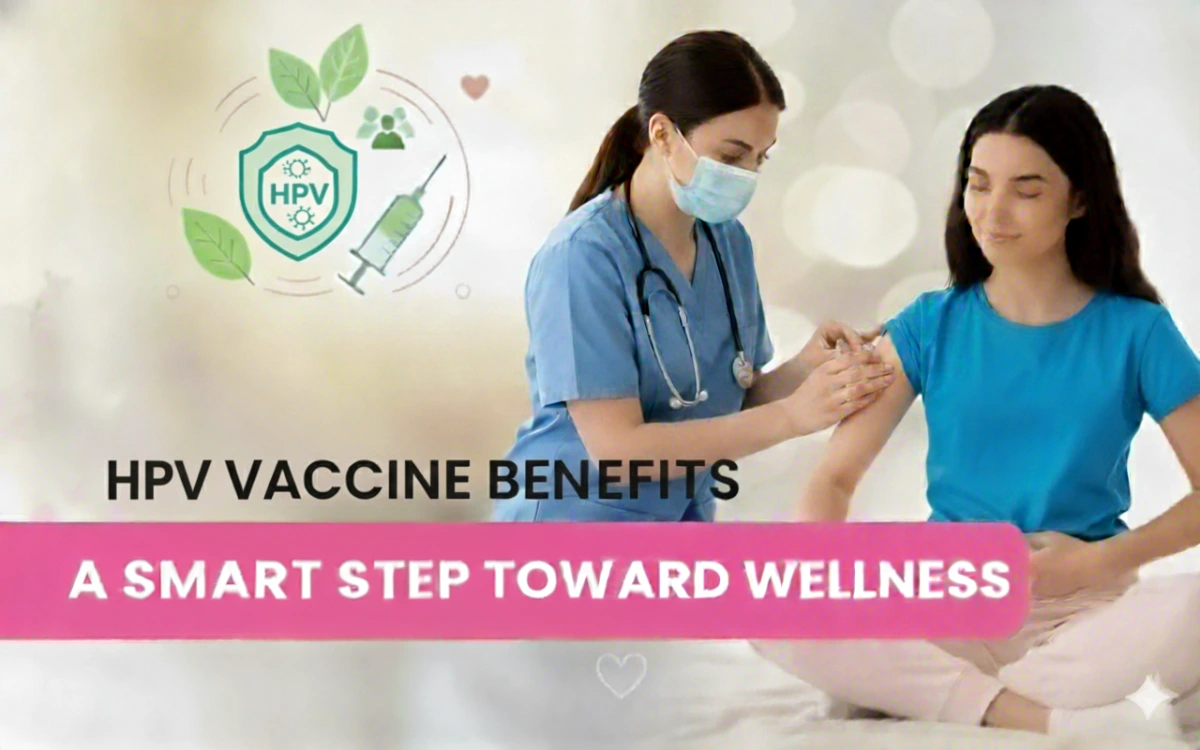The human papillomavirus is common, easy to catch, and often invisible. Most infections clear on their own, but some linger and can lead to cancers of the cervix, vagina, vulva, anus, penis, and the back of the throat, as well as genital warts. That is why the HPV vaccine matters. It shields the body before exposure, blocks the virus types that cause the greatest harm, and lowers cancer risk years into the future. When people talk about the cervical cancer vaccine, they are referring to this same protection. The vaccine is for girls and boys, women and men, because HPV touches families, not only individuals.
For families in Dubai, vaccination is straightforward. Clinics and hospitals across the city offer modern schedules and careful counselling. If you have wondered whether to vaccinate, or you are comparing HPV vaccine benefits against worries about safety, side effects, or age, this guide offers clear answers. You will learn how the vaccine works, who should get it and when, how it pairs with screening, what to expect on the day, and where to get the HPV vaccine in Dubai with trusted specialist support.
Why HPV prevention is such a powerful choice
HPV includes many virus types. Two of them, types 16 and 18, are responsible for about seven in ten cervical cancers worldwide. The current nine-valent vaccine covers those two and adds protection against additional high-risk types, plus the types that cause most genital warts. That broader shield is the reason experts consider it such a valuable cancer prevention tool. The World Health Organization summarises the benefits simply. Vaccines are highly effective at preventing infection with types 16 and 18, the main drivers of cervical cancer.
Protection is not limited to the cervix. The US Food and Drug Administration lists approved uses for Gardasil 9 that include preventing precancers and cancers of the cervix, vulva, vagina, anus, and oropharynx, along with genital warts, in females and males nine through forty-five years of age. The same document lists the nine HPV types covered by the vaccine. In practical terms, this means one course helps block several cancers at once.
The most protective window is before someone becomes sexually active, since HPV spreads through intimate skin contact. That is why routine vaccination is advised for preteens and early teens, with catch-up options for young adults. The US Centers for Disease Control and Prevention recommends starting at ages eleven to twelve, with the option to begin at nine, and catch-up vaccination through age twenty-six if not vaccinated earlier. Adults twenty-seven through forty-five may still benefit after a conversation with their clinician about individual risk and likely gain.
How the vaccine works and what the schedule looks like

The HPV vaccine contains virus-like particles. These are empty shells that look like the virus to the immune system but contain no genetic material, so they cannot cause infection. Once injected, the immune system produces antibodies that neutralise HPV on future contact. The result is HPV prevention that lasts for many years and reduces the chance that a persistent infection will ever take hold.
The number of doses depends on the age at which you start. When the first dose is given before the fifteenth birthday, two doses are recommended, with the second dose six to twelve months after the first. When the series begins at ages fifteen through twenty-six, or for those who are immunocompromised, three doses are recommended on a zero, one to two, and six-month timeline. If doses are spaced too closely in a two-dose plan, a third dose may be needed to complete protection. These schedules are explained clearly for clinicians and the public by the CDC.
It is never too late to ask whether vaccination still makes sense. Even if someone has been sexually active, they are unlikely to have encountered all nine types covered, so vaccination can still offer future benefit. The FDA has authorised use through age forty-five, and shared decision-making with a clinician helps adults weigh benefits against cost and timing.
Safety, side effects, and who should wait
HPV vaccination has one of the most closely studied safety records in modern immunisation. Large safety systems, registry data, and many studies show a strong safety profile. The most common reactions are mild and short-lived, such as a sore arm, low fever, headache, or tiredness. Severe allergic reactions are rare. People who had a serious allergy to a prior dose or to a vaccine component, including yeast, should not receive the vaccine. The CDC also addresses concerns about fertility and primary ovarian insufficiency and reports no evidence of causal links.
The vaccine is not recommended during pregnancy. If a dose is given before pregnancy is known, there is no reason for alarm; later doses are simply delayed until after delivery. Routine pregnancy testing before vaccination is not needed, and women who are breastfeeding may receive the vaccine. These points are repeated in guidance for obstetric and gynaecologic care.
Benefits you can count on
When communities vaccinate broadly, cervical precancer rates fall, genital warts nearly disappear in younger cohorts, and modelled cancer prevention becomes real. A large Swedish study confirmed a sharp drop in cervical cancer among vaccinated women compared with those who were not vaccinated, especially when vaccination occurred at younger ages. Public health organisations describe the combination of vaccination and screening as the strongest protection for a future without cervical cancer.
There are day-to-day benefits as well. Families spend less time managing abnormal screening results, fewer procedures are needed to remove precancerous cells, and anxiety around future risk drops. For men and women, the vaccine reduces the burden of anal and oropharyngeal disease caused by the covered HPV types. The FDA’s current label spells out these broader indications clearly.
The vaccine and screening work together
The HPV vaccine lowers risk. It does not replace the need for routine screening if you have a cervix. Screening finds cell changes early, even changes caused by HPV types not covered by the vaccine. For most people, that means Pap testing and HPV testing on the schedule recommended for their age group. The US Preventive Services Task Force and professional societies outline several acceptable strategies, and they all agree on one message. Continue screening on schedule, even after full vaccination. Public health pages for women’s health repeat that reminder so no one is left unprotected.
Frequently asked questions, answered simply
Is the HPV vaccine only for girls and women?
No. HPV affects everyone. Vaccination is recommended for girls and boys in early adolescence, with catch-up through age twenty-six. Men and women up to age forty-five may still gain benefits after discussing personal risk with a clinician.
Does vaccination encourage earlier sexual activity?
Studies do not support this concern. The vaccine prevents infections that can lead to disease. It does not change values or behaviour. Public health groups endorse vaccination as a cancer prevention tool rather than a message about sexual choices.
Can the vaccine treat an existing HPV infection?
No. The vaccine prevents new infections. It does not clear infections already present. This is another reason to vaccinate earlier, ideally before exposure.
What if my child missed the ideal age?
Start now. Two doses are used if the series begins before age fifteen and is spaced correctly. Three doses are used if vaccination begins at ages fifteen through twenty-six or if the person is immunocompromised. Shared decision making guides adults twenty-seven through forty-five.
What should I expect after the shot?
A sore arm is most common. Some people notice a mild fever, headache, dizziness, or tiredness for a day or two. Serious reactions are rare, and vaccinators are trained to manage them. Sitting for fifteen minutes afterward helps prevent fainting in teens.
Where to get HPV vaccine in Dubai
Dubai has strong public and private options for preventive care. The Dubai Health Authority publishes immunisation guidance that includes the HPV schedule used in the emirate, and national health authorities have set ambitious targets to protect girls before age fifteen as part of the strategy to eliminate cervical cancer. In practical terms, this means the vaccine is available at major hospitals, primary health centres, family medicine clinics, and specialist women’s health clinics across the city. If you prefer a gynaecology-led service with counselling about timing, fertility plans, and screening, you can schedule your vaccination with Dr. Neha Lalla at Prime Hospital and have your questions answered in one visit.
Preparing for your appointment
Bring your vaccination record if you have one. Tell your clinician about allergies, any past severe reaction to a vaccine, and current medicines. If you are pregnant, the start of the series should wait until after delivery, although accidental vaccination early in pregnancy does not require any special action other than delaying the remaining doses. If you are breastfeeding, you can proceed as planned. Plan to remain seated for a short observation period after the injection. These small steps make the visit smooth and safe.
How vaccination fits into a broader wellness plan
The HPV vaccine benefits your long-term health, but it is one part of prevention. Continue regular cervical screening on the schedule advised for your age and history. Practice safer sex, since condoms reduce but do not eliminate HPV transmission. Do not smoke, because tobacco makes it harder for the body to clear HPV. Keep routine health checks and ask about other vaccines that may suit your stage of life. In busy cities like Dubai, planning these steps ahead keeps wellness from falling off the calendar.
A note on cost and access
Coverage and pricing vary in the private sector, and employer insurance policies differ. Many clinics offer package pricing for the full course. If cost is a concern, ask about instalments or bundled care that includes consultation and vaccination. National and emirate-level initiatives are expanding access to vaccination and screening as part of the effort to reduce cervical cancer across the UAE, and those programs continue to mature. Your clinician can advise on the most affordable route for your situation.
A word from Dr. Neha Lalla
I encourage families to view the HPV vaccine as a gift to their future. It protects against the virus types most likely to cause cancer. It reduces the number of procedures many women face later in life. It supports community health by shrinking the pool of circulating infection. If you have questions about timing, safety, or how vaccination fits with your screening history, I am happy to discuss the details and create a plan that suits your goals.
Conclusion and next steps
The cervical cancer vaccine is one of the safest and most effective tools in modern prevention. It offers broad HPV prevention, protects men and women, and partners perfectly with screening to keep families healthy. When you weigh the HPV vaccine benefits, the case is strong. Vaccination lowers cancer risk, prevents genital warts, and brings long-term peace of mind with a simple, well-tolerated course.
If you are looking for where to get the HPV vaccine in Dubai, book a consultation with Dr. Neha Lalla at Prime Hospital. You will receive clear counselling, a schedule tailored to your age and health, and ongoing menopause support and women’s health care as life stages change. Protect your future with a smart step today.


